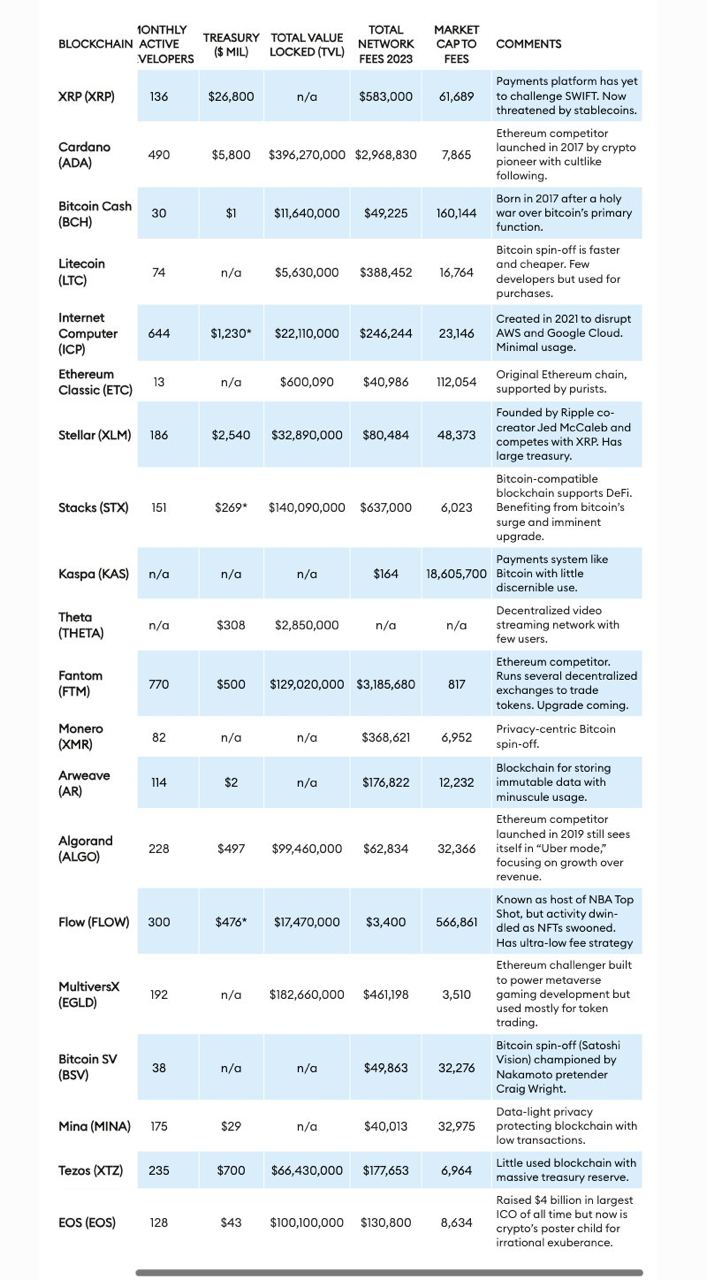
Share this article
The number of tokens exceeds 14,000, and the crypto market cap stands at $2.4 trillion, but more may not always be merrier. Forbes has identified a group of 20 cryptos, dubbed “zombie blockchains,” that maintain high market valuations despite showing little to no real-world utility or user adoption.
The list includes well-known names such as Ripple (XRP), Cardano (ADA), Litecoin (LTC), Bitcoin Cash (BCH), and Ethereum Classic (ETC), all of which are characterized by their continued operation and trading without fulfilling practical purposes.
The term “zombie blockchains” refers to blockchain projects that, like the undead, exist but do not exhibit signs of life in terms of utility or substantial user bases.
These tokens continue to exist and sometimes even thrive financially due to speculative trading and substantial initial funding rather than because they have achieved their technological or practical goals.

Forbes analysts noted that Ripple’s XRP was initially designed to compete with the SWIFT banking network by facilitating rapid international bank transfers at minimal fees. However, it has failed to disrupt SWIFT and now relies heavily on speculative trading for its high market value, with minimal revenue from actual network usage.
“It’s largely useless, but the XRP token still sports a market value of $36 billion, making it the sixth-most valuable cryptocurrency,” analysts described.
“Ripple Labs is a crypto zombie. Its XRP tokens continue to trade actively, some $2 billion worth per day, but to no purpose other than speculation. Not only is SWIFT still going strong, but there are now better ways to send payments internationally via blockchains, especially stablecoins like tether, which is pegged to the U.S. dollar and has $100 billion in circulation,” they added.
Similarly, hard forks like Litecoin, Bitcoin Cash, Bitcoin SV, and Ethereum Classic are valued at over $1 billion but are underutilized, serving more as speculative investments than practical applications, according to Forbes.
These tokens often result from disagreements within developer communities and persist due to their historical significance or the inertia of speculative trading.
“What’s keeping these zombies alive is liquidity,” analysts cited a VC’s statement.
Analysts also pointed to the “Ethereum killers,” such as Tezos (XTZ), Algorand (ALGO), and Cardano (ADA), as a major part of this phenomenon.
Despite technological advancements and substantial valuations, these tokens have not seen major adoption or activity. Although they offer advanced transaction processing capabilities, they have difficulty converting these capabilities into widespread acceptance or developer engagement.
“Some blockchain zombies seem to trade solely based on the popularity of their creators. Cardano, another Ethereum competitor, was launched in 2017 after its cofounder, Charles Hoskinson, had a falling-out with Buterin, his Ethereum cofounder,” analysts suggested that speculative interest in Cardano is mainly driven by its founder’s prominence.
Forbes’ report also touches on the lack of governance and financial accountability mechanisms in these blockchain entities, which operate without regulatory oversight or obligations to shareholders. This complicates efforts to assess their viability or financial health, as seen in cases like Ethereum Classic, which continues to be traded actively despite suffering major security breaches.
Share this article
The information on or accessed through this website is obtained from independent sources we believe to be accurate and reliable, but Decentral Media, Inc. makes no representation or warranty as to the timeliness, completeness, or accuracy of any information on or accessed through this website. Decentral Media, Inc. is not an investment advisor. We do not give personalized investment advice or other financial advice. The information on this website is subject to change without notice. Some or all of the information on this website may become outdated, or it may be or become incomplete or inaccurate. We may, but are not obligated to, update any outdated, incomplete, or inaccurate information.
Crypto Briefing may augment articles with AI-generated content created by Crypto Briefing’s own proprietary AI platform. We use AI as a tool to deliver fast, valuable and actionable information without losing the insight – and oversight – of experienced crypto natives. All AI augmented content is carefully reviewed, including for factural accuracy, by our editors and writers, and always draws from multiple primary and secondary sources when available to create our stories and articles.
You should never make an investment decision on an ICO, IEO, or other investment based on the information on this website, and you should never interpret or otherwise rely on any of the information on this website as investment advice. We strongly recommend that you consult a licensed investment advisor or other qualified financial professional if you are seeking investment advice on an ICO, IEO, or other investment. We do not accept compensation in any form for analyzing or reporting on any ICO, IEO, cryptocurrency, currency, tokenized sales, securities, or commodities.
See full terms and conditions.




Be the first to comment